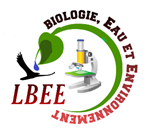Presentation of the laboratory:
The Laboratory of Biology, Water and Environment (LBEE) is one of the 23 research laboratories of the University 8 May 1945 Guelma. It was created by ministerial decree of 16 March 2011. The activities are led by four (04) research groups composed of 28 permanent researchers and 02 doctoral students. The laboratory is under the direction of Professor Houhamdi Moussa.
The objectives:
The primary objective of the laboratory is to train young researchers for research and by research, to value the results obtained in teams, to ensure scientific dissemination by making it accessible to researchers from different backgrounds. The development of quality scientific research that takes into account national guidelines and needs and universal incentives and concerns is also primordial
The research activities of the Laboratory of Biology, Water and Environment "LBEE" study all possible interactions between biocenosis (fauna, flora and microflora) with their biotope (mainly aquatic environments). The aquatic environments are considered to have played an essential and primordial role at the dawn of great civilizations. thereby, marshes, wadis, lakes and swamps have, for nearly two millennia, inherited a such reputation which have regressed dramatically on most continents, especially in the 20th century with technological advances that enabled their transformed. Indeed, this rapid disappearance had at least the merit of rediscovering the importance of these continental and coastal hydrosystems.
However, it soon became apparent that their recoil was accompanied by major ecological or environmental disorders, such as the increase in the frequency of devastating floods, the degradation of water quality and sometimes the considerable reduction of certain bird water populations and fishery resources of big rivers. These great civilizations which were built in the framework of a special relationship with these aquatic ecosystems (large rivers and large lakes), which created a certain imbalance causing the accumulation of micropollutants and the emergence of water-transmissible diseases.
This research laboratory, with its wide coverage of themes, reflects our concern to carry back the acute programs of the moment (source of nuisance, animal reproduction, destabilization of ecosystems ..) to equations to put into practice in order to study both the Causes and their impact and to give off concrete proportions as to implementation for sustainable development and a significant scientific advance.
The main scientific objective is to study and characterize the different aquatic ecosystems (lotic and lentic) and their environments of our region (biology, hydrochemistry, hydrogeology, geology and preservation of species by reproduction) and to determine the anthropic factors exerted on As well as exploring their consequences (eco-toxicological, toxicological and microbial) and their impact on humans, animals and the environment. Consider also the relationship between human health and the environment, which assumes considerable importance at a time when the announced disasters and pandemics continue to multiply. While infectious diseases of recent centuries have been relatively well controlled, or circumscribed, warnings about the proliferation of sources of contamination are raised again. Global warming is leading to a relocation of transmission vectors, thus extending potential sources of bacterial or viral contagion.
